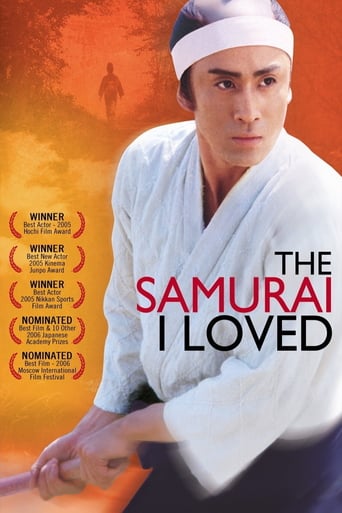OG
(no actual plot specifics are revealed) I had high hopes for this and was quickly brought down to earth. And interminable movie, made longer by an interminable preamble that did little to enhance anything with the meat of the movie. Based on a book by Shuhei Fusjisawa, who's Twilight Samurai novel was so masterfully adapted by the talented Yoji Yamada, this is a glorified Harlequin Romance of love interrupted. And interrupted. And interrupted. The whole movie could have been cut by 40 minutes, including some scenes which were repetitive and others that made no sense. Perhaps it was even longer and the editor was at a loss?Without revealing anything specific, suffice it to say that this chanbara movie builds up to the one big sword fight scene, doesn't even do it justice after all that foreplay, then falls back to more love interrupted. You feel like hurling your dime store romance paperback at the screen. A few nice camera shots don't make up for endless preamble of furtive glances and halting touches. In fact, I don't think the two lovers touch more than three times their whole lives together. Any allusions to traditional Japanese customs in feudal Japan is bogus, because marriage and divorce was common then, especially in the samurai class.Skip this and watch Twilight Samurai 2x instead to see how a real movie should be made.
WILLIAM FLANIGAN
THE SAMURAI I LOVED / CICADA CHIRPING (LIT.) (SEMISHIGURE). Viewed on DVD. Subtitles = seven (7) stars; score = seven (7) stars; costumes = four (4) stars; choreography = four (4) stars; surround sound = four (4) stars; cinematography = two (2) stars. Director Mitsuo Kurotsuchi (who is also credited as co-screen writer) delivers an Edo period non-starter "love story" that is uneven, snail-paced, and mostly emotionless as well as poorly photographed, costumed, choreographed. The movie might be summed up as: teenage boy meets teenage girl, boy loses girl (and Vice Versa), boy (now grown) re-meets (after two hours of confusing plot trivia) mature girl, but its way, way too late (including for the audience that hasn't fallen asleep). To say that the actors lack direction would be a bit of an understatement. A noticeable mismatch in the similarity of teenage actors and their adult counterparts does not seem to help matters. Inter-scene continuity also falls by the wayside as editing makes for nonsense in the last quarter of the movie. Costumes (even those worn by characters at court) look cheap. Sword-swinging choreography (there is about five minutes in total) appears fairly phony with stunt actors being permanently incapacitated from a sword whacking while "good-guys" after being slashed in the same way seem fine and/or recover completely in the next scene or two! Except for medium shots using a telephoto lens to capture shimmering waves of heat, cinematography (wide-screen, color) is a disaster zone. Scenes (especially exteriors) are fuzzy-filtered as if photographed through mosquito netting! Many are also not quite in focus. Lead actress Yoshino Kimura's different size eyes are usually on full display (particularly in close-ups due to the use of unflattering camera angles) which can distract from her performance. Surround sound fields are poor to nonexistent. Score is very good and ranges from rousing music played by a small orchestra to haunting single notes from a piano. Subtitles are well done. The viewer has a choice of colors for expository text and lines delivered by different characters. Inter-scene consistency for the latter is fine. Great shots of cicada and snakes. WILLIAM FLANIGAN, PhD.
deetya
What a wonderfully shot film. It's films like these that theaters (or big screen TVs) are meant for :-) For example, when the disgraced Samurai is showing his friend to his new hovel, located in an alley, when it's raining with mud puddles everywhere. However, the scene starts by an overhead shot showing two umbrellas going down the narrow alley, and is shot such that at first we think it is two flower petals floating down a stream. That's a good shot. There's also the acting, with all the emotions indicated simply by a look or a small gesture.The only drawback is that it is too much of a tearjerker kind of movie. I mean, a samurai movie that is also a chick movie? A clang-slash movie that your girlfriend will also like? Oh, wait, that would be a good thing wouldn't it?
Ian Seta
Bunshiro, a young samurai finds himself on the wrong side of clan politics when his father is accused of plotting against the clan and forced to commit seppuku (ritual suicide). He and his mother find themselves evicted from their home and forced to live in a hovel. But Bunshiro is a talented swordsman and after a time he is reinstated and becomes a magistrate, filling the same job as his father. As he tours the countryside he discovers the political maneuvering which led to his fathers death is still widespread, and his childhood love who is now one of the lord's concubines has become an unwilling pawn. She has given birth to a boy and a rival faction has decided to kill the boy and blame Bunshiro.Based on a story by Shuhei Fujisawa, who also wrote the stories "Twilight Samurai" and "Hidden Blade", Semi Shigure is a personal and intimate portrait of the life of a lowly ranked samurai. For fans of the genre, it's a must see.



